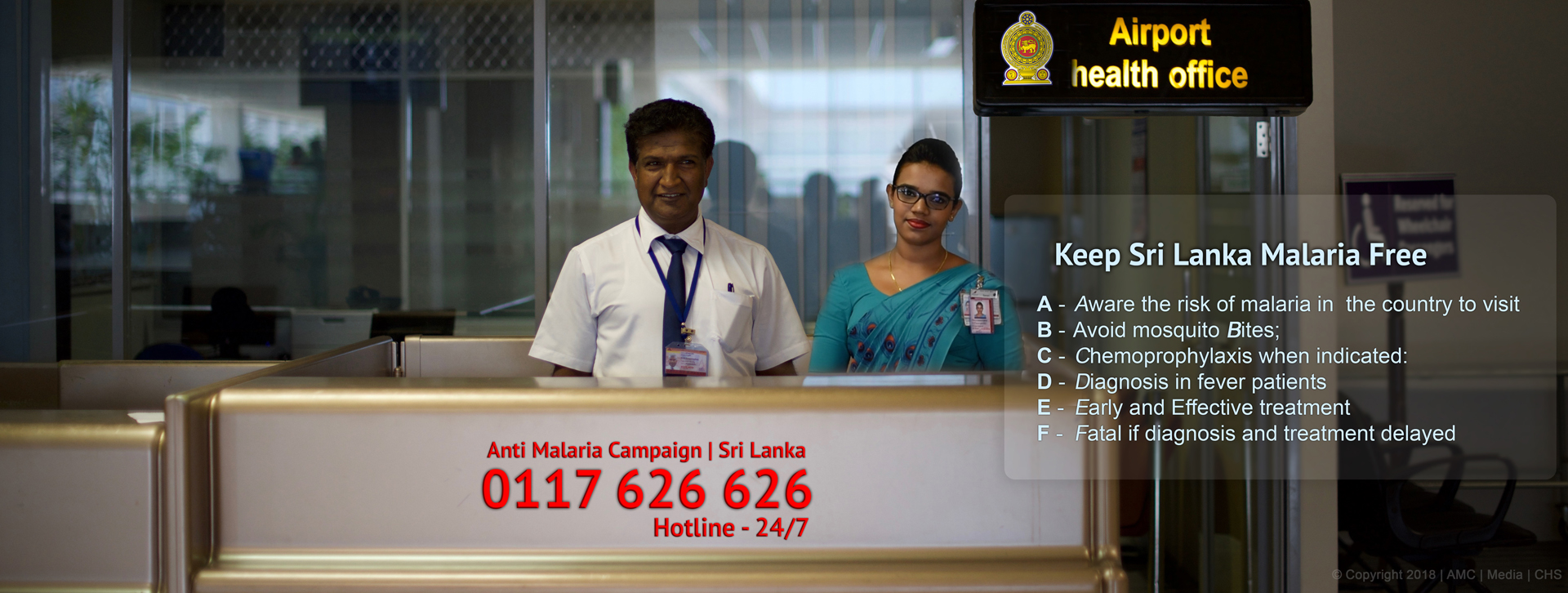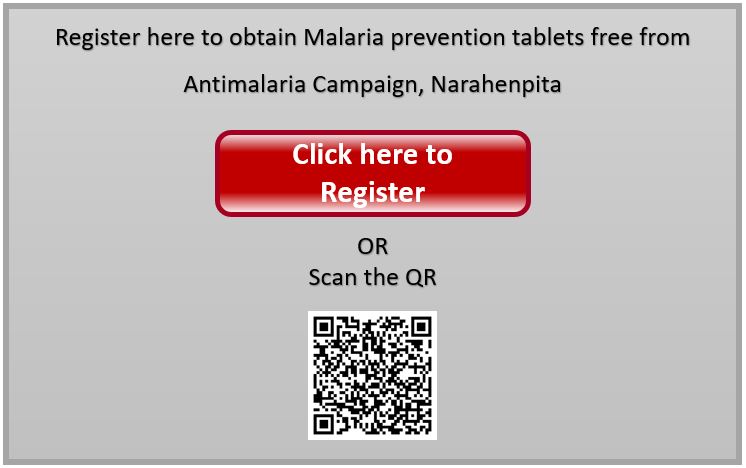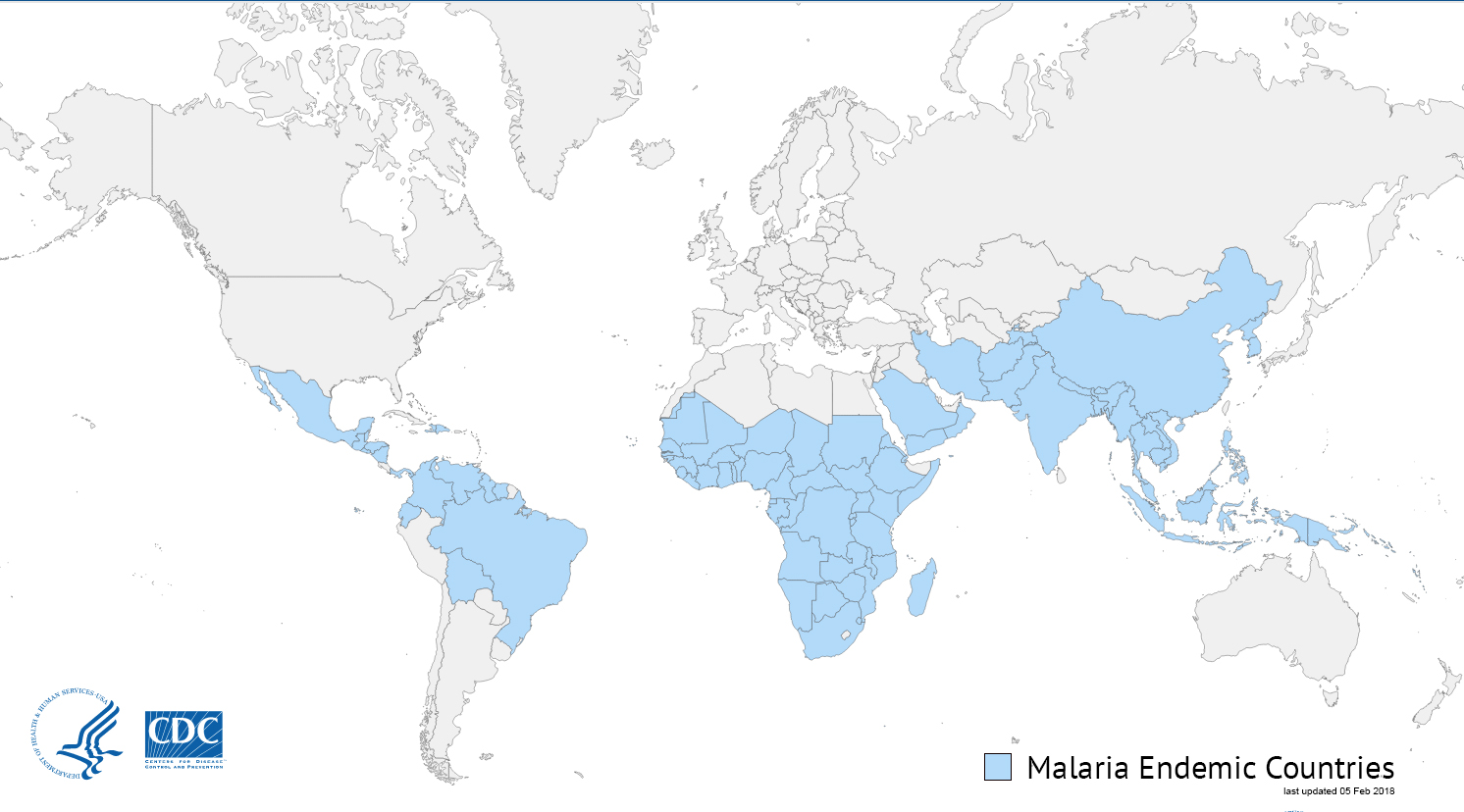
Guideline for Travelers to malaria endemic countries
Anti-Malaria Campaign | Ministry of Health –Sri Lanka
Currently Sri Lanka is successfully controlled malaria transmission within the country and was certified by the World Health Organization as a malaria-free country in September 2016. However, malaria is endemic in many tropical and subtropical countries and Sri Lankans travelling to these countries are at a high risk of acquiring malaria unless they take precautions since they lack immunity against the disease. Although there is no malaria transmission occurring in Sri Lanka, Sri Lanka is at a great risk of re-introduction of malaria at any moment and the major threats for re-introduction of malaria include the increasing number of malaria infected persons entering in to Sri Lanka from malarious countries while vector mosquitoes are prevalent in most parts of the country.
Malaria is a life threatening disease caused by plasmodium parasite which is transmitted by the dusk to dawn biting female Anopheles mosquito. People infected with malaria often experience fever, chills and flu-like illness at first. Left untreated, the disease can lead to severe complications and, in some cases, death. Malaria symptoms appear after a period of seven days or longer after an infective mosquito bite.
The classic presentation of malaria is not observed in all and malaria presenting with atypical manifestations are common among travellers. Travelers who become ill with a fever or flu-like illness either while traveling in a malaria-risk area or after returning home (for up to 1 year) should seek immediate medical attention and should tell the physician their travel history to malaria endemic countries in order to be screened for malaria.
Risk groups
Travelers to sub-Saharan Africa have the greatest risk of both getting malaria and dying from their infection. Furthermore, many countries in South Asia and South East Asia neighbouring Sri Lanka are highly malarious. Travellers to these countries are also at risk of contracting the disease. Some groups of travellers, especially young children, pregnant women and individuals with a weakened immune system, are at increased risk of developing serious illness if they become infected with malaria.
Preventing mosquito bites
- Prevention of mosquito bites between dusk and dawn is the first line of defence against malaria. Avoiding unnecessary travel (specially pregnant women and children) to places where malaria is endemic, staying indoors during dusk to dawn and lodging in a safe place with mosquito mesh for windows are recommended for all travellers. Other measures to prevent mosquito bites include;
- Sleep under bed nets preferably long-lasting insecticidal nets
- Use insect repellents (ex: DEET ≥30%)
- Use protective clothing (ex: long sleeve shirts, long trousers)
- Use mosquito sprays, mats, or vaporizers when necessary
Chemoprophylaxis
- Depending on the malaria risk in the area to be visited, international travellers may also need to take preventive medication (chemoprophylaxis) prior to, during, and upon return from their travel.
- Consultation on preventive chemotherapy must be considered about three weeks before travel.
- Travellers and their doctors should be aware that no antimalarial prophylactic regimen gives complete protection, but good chemoprophylaxis (adherence to the recommended drug regimen) significantly reduces the risk of fatal disease.
- All prophylactic drugs should be taken with unfailing regularity for the entire duration prescribed.
- If a traveler develops a severe adverse effect after taking a chemoprophylactic antimalarial drug, he/she should be advised to stop medication and seek medical advice
- An individual who experiences fever a week or more after entering to a malarious area should consult a physician or qualified malaria laboratory immediately to obtain a correct diagnosis and safe and effective treatment.
Any traveller planning to visit a malarious country is advised to contact Anti Malaria Campaign and seek medical consultation on preventive methods at least 10 days before commencement of travel.
Anti-Malaria Campaign
Ministry of Health
555/5 Elvitigala Mawatha
Colombo-5
Phone- 011-2588408/2368173/2581918
Fax- 011-2368360
Hotline- 0117 626 626



